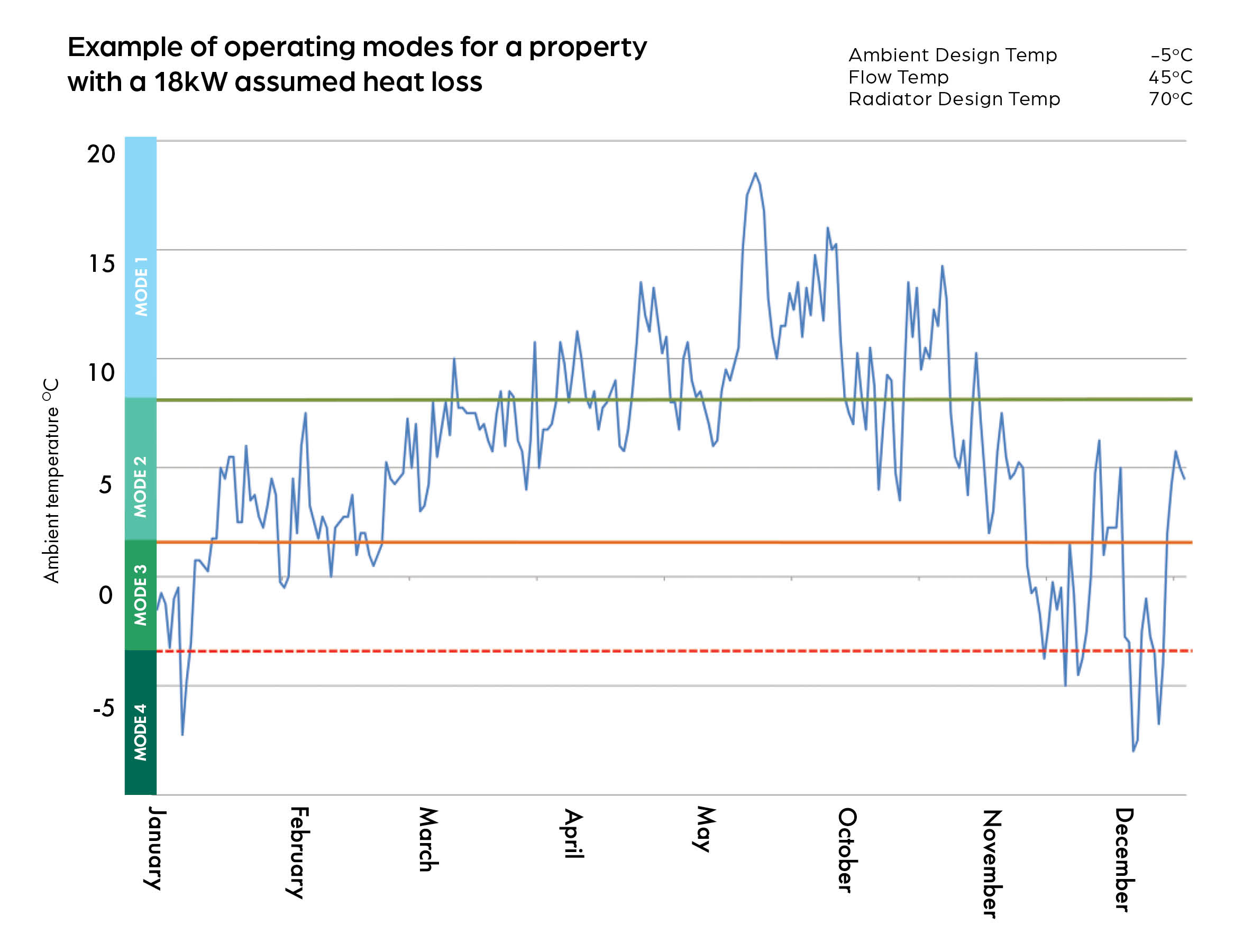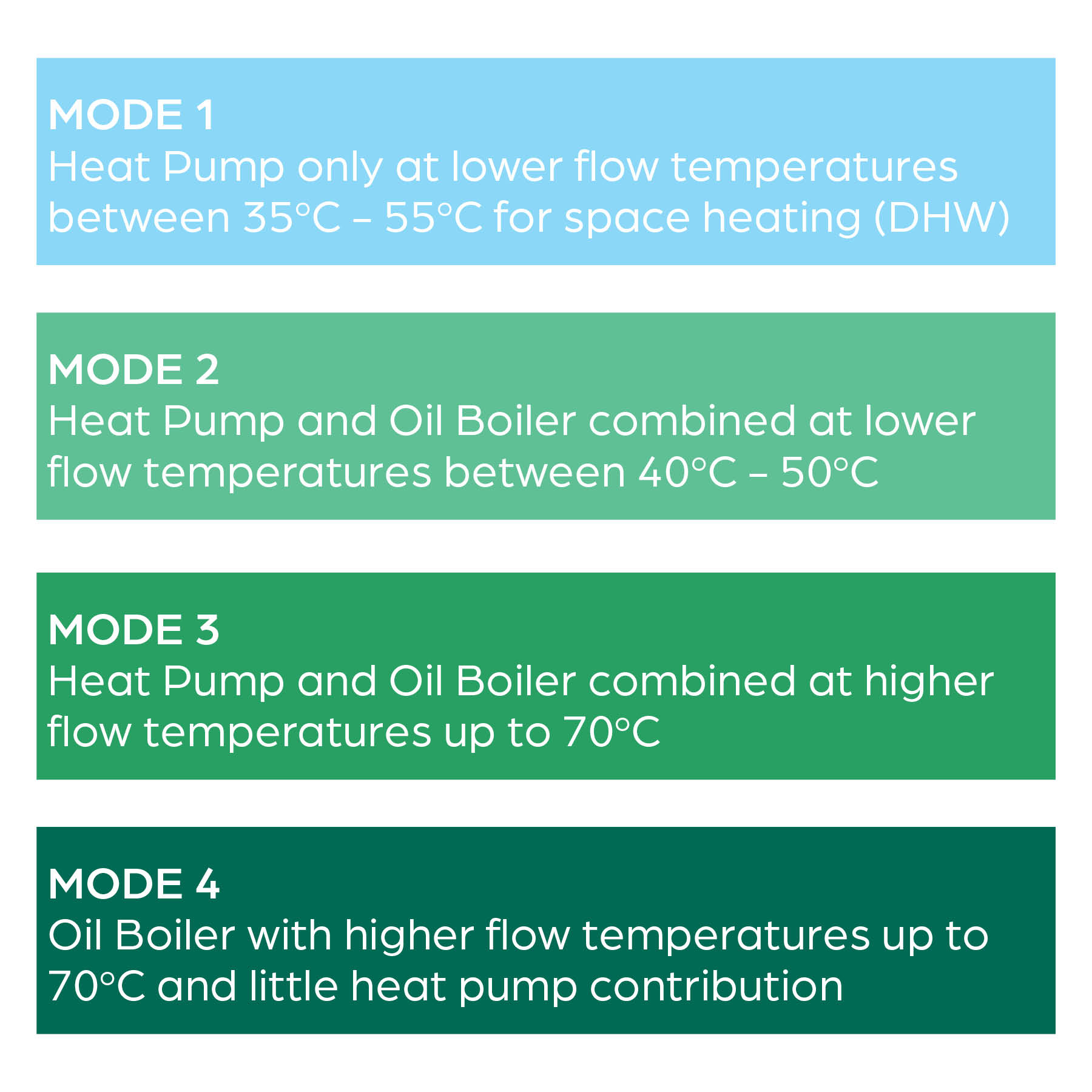A hybrid heating system, which combines a renewable heat source with a traditional fossil fuel boiler, can help homeowners transition to more sustainable home heating when it may not be possible for them to completely swap to renewable energy. In this article, we will look at the advantages of hybrid heating and the types of properties it is suitable for.
More and more homeowners are looking at the ways they can reduce their impact on the environment, making changes to their lifestyle and around their home to lower their carbon emissions. Home heating is one area under the spotlight with households evaluating their current central heating system and researching alternatives which are more environmentally friendly. Low carbon heating solutions, such as air-to-water heat pumps, are becoming increasingly popular but not all homes are ready to move to these low temperature systems. This is where hybrid heating products can step in, helping homes to incorporate greener, renewable energy with the back-up of a traditional heat source.
If you are interested in learning more about heat pumps and whether your home is suitable for one, please follow one of the links below:
Discover more about how heat pumps work…
Learn about what properties are suitable for a heat pump…
Read some top questions to ask before buying a heat pump…
What is a hybrid heating system?
A hybrid heating system combines more than one heat source that work together in a single heating system. Typically, this will include a renewable source of energy with a fossil fuel appliance - for example an air source heat pump combined with an oil-fired boiler (such as the VortexAir Hybrid) or an air source heat pump combined with a gas boiler (such as the EvoLink Hybrid System Hub). In a hybrid heating system, the renewable appliance will fulfil a significant proportion of the annual space heating and hot water demand of a property, with the fossil fuel appliance meeting the remaining demand, usually during the colder months of the year.
Visit our Education Area to learn more about how hybrid heating systems work.

What is the difference between a heat pump and hybrid?
A heat pump is a standalone heat source that will fulfil all your home’s space heating and domestic hot water (DHW) requirements. There are different types of heat pump available with air source heat pumps being one of the most popular options – learn more about air source heat pumps and how they work here. Meanwhile, a hybrid heating system usually combines two heat sources in one system. One of these heat sources will be renewable, such as an air source heat pump, and the second heat source will be a traditional boiler with the two products sharing the load of fulfilling your home’s heating and hot water demand.
How does a hybrid heat pump work?
There are different types of hybrid systems available and each one will operate differently but the basic principles of how the systems work will be similar. The air source heat pump will be located outside where the unit will draw in the outside air, extract the latent heat energy and transfer this into useable energy within the heating system to heat up your rooms and hot water. Depending on the heating demand of your property and its heat loss will determine the proportion of the demand the heat pump will fulfil.
To fulfil the balance of the demand, the secondary heat source will then work to provide the remaining heat needed to ensure that all your property’s space heating and domestic hot water requirements are met. Managing the operation of the heat pump and the secondary heat source will be a central controller which will monitor the temperatures in your rooms and any demand for hot water at the taps. This control will communicate with both the heat pump and the secondary heat source, calling them on either independently or separately (depending on the system set-up) when there is a demand. In most instances, these controls will prioritise the use of the heat pump over the secondary heat source whenever possible.
The infographics below show the different modes of operation that the Grant VortexAir Hybrid uses, with the graph showing how the operating modes seamlessly change depending on the ambient air temperature and assumed heat loss for the property.



 What are the advantages of a hybrid heat pump?
What are the advantages of a hybrid heat pump?
Now that we have explained what hybrid heat pumps are and how they work, let us look at the benefits they can offer.
Heating capacity
As mentioned above, most hybrid heating systems feature a heat pump and, depending on the size and heat loss of a property, the heat pump will be able to meet a significant proportion of the heating demand. With hybrid heat pumps, they offer the additional benefit of the second heat source as the back-up or supplementary heater which means for properties where a heat pump alone is not currently suitable, a hybrid system offers them the opportunity to incorporate some form of renewable energy into their central heating.
Low carbon emissions
While a hybrid heating system still uses some form of fossil fuel, the addition of the heat pump will reduce the demand on the oil or gas boiler. With the heat pump working to meet a proportion of the space heating and hot water demand, the traditional boiler is used less, reducing the amount of fuel it uses which in turn reduces the amount of emissions it produces. Furthermore, if you install a hybrid heat pump system and then improve the insulation of your property to reduce its heat loss (see below for further information), then the heat pump will be able to fulfil more of your annual heating and hot water demand, further reducing the workload of the boiler and further reducing the emissions produced.
In addition, the VortexAir Hybrid incorporates a HVO compatible oil boiler which means it can operate using a low carbon liquid fuel which has significantly lower carbon emissions compared to kerosene oil. Learn more about HVO biofuels in home heating here.
Reduce dependency on fossil fuels
Not only will a hybrid heating system reduce carbon emissions, it will also help a household reduce their dependency on fossil fuels. Unlike with a standalone gas or oil boiler, whereby all your space heating and DHW demand is fulfilled using a fossil fuel, with a hybrid heat pump system, renewable energy will be used as well to heat your home and hot water. Consequently, you will no longer be solely relying on a fossil fuel as the energy source for your central heating system.
Spread the costs of additional home improvements
One of the main advantages of a hybrid heat pump is it gives homeowners the opportunity to add renewable energy into their heating system straightaway, with little or no changes needed elsewhere in the home. Over the coming months or years, it may then be feasible for additional energy efficiency measures to be carried out such as improving wall or roof insulation or installing double-glazed windows. Measures such as these will then reduce the amount of heat escaping from the property which in turn will help the heat pump to meet more of the heating requirements.
In some instances, once a home has sufficiently improved its heat loss calculations, it may be possible for the heat pump to fulfil all the heating and DHW demand. A hybrid heating system can therefore be the stepping-stone to help a home transition completely away from fossil fuels but at a more gradual pace, enabling the costs of additional energy efficiency improvements to be spread over time rather than at the point of installation.
What types of homes are suited to hybrid heating?
A lot of homes will already be suitable for a standalone air source heat pump, especially those built after the late 1990s because their insulation levels will be sufficient – you can read our blog here to learn more about whether your home may be suitable for a heat pump already. For older properties with thinner walls or single-glazed windows, a heat pump alone may not be suitable until the heat loss of the property is improved so a hybrid heating system can be the next best lower carbon option. Hard-to-heat homes or rural properties off the grid are just a couple of examples of homes which a hybrid heating system will be suitable for.
Interested in learning how a Grant VortexAir Hybrid has performed in an older property? Read one of our case studies which shows how this heating system has performed in a two-hundred year old listed cottage.
Can I use my existing boiler with a heat pump?
This will depend on the type of boiler you currently have and the type of hybrid heating system you are planning to install. The Grant EvoLink Hybrid System Hub, for example, can facilitate the addition of a new Aerona³ R32 heat pump with most existing boilers whether they be gas, oil or LPG boilers. You could therefore keep your current boiler and have this working alongside a new heat pump, enjoying the best of both worlds.
What is the Grant EvoLink Hybrid System Hub?
The EvoLink Hybrid System Hub is a white cased unit that is designed to be wall mounted inside your home, in your utility room for example. Inside its casing, the EvoLink houses the components required to connect a new Aerona³ R32 air source heat pump to an existing heating system, allowing you to use your existing boiler while adding a renewable energy source to your central heating system. The EvoLink features a control system which manages both the boiler and the heat pump, operating the heat pump as much as possible and using the boiler as the supplementary heater, providing the back-up heating when required.
The diagram below summarises the system set up using the EvoLink Hybrid System Hub.

What is the Grant VortexAir Hybrid?
The Grant VortexAir Hybrid differs to the EvoLink Hybrid Heating Hub. The VortexAir couples together a new Vortex 15/26kW condensing oil-fired boiler with an Aerona³ R32 17kW air source heat pump, and it can either be installed as a single unit fitted externally or the boiler can be installed inside with the heat pump always fitted outside. Using a simple plumbing and electrical arrangement, the VortexAir Hybrid is typically installed when an old oil boiler needs replacing as it can restore heat to a home straightaway (via the installation of the hybrid’s boiler) with the heat pump installation either following immediately or at a later date.
Find your Grant Hybrid Heat Pump
Here at Grant UK, we take pride in developing low carbon heating solutions for as many types of homes as possible. Advanced hybrid heating systems are one of these solutions, blending the eco-friendly benefits of an air source heat pump with traditional fossil fuel heating, helping homes that are difficult to heat decrease their dependence on fossil fuels.
To discover more about EvoLink and Grant UK’s Hybrid heating range, please visit www.grantuk.com/products/hybrids. You can also view our dedicated FAQs about Hybrid Heating Systems here.
